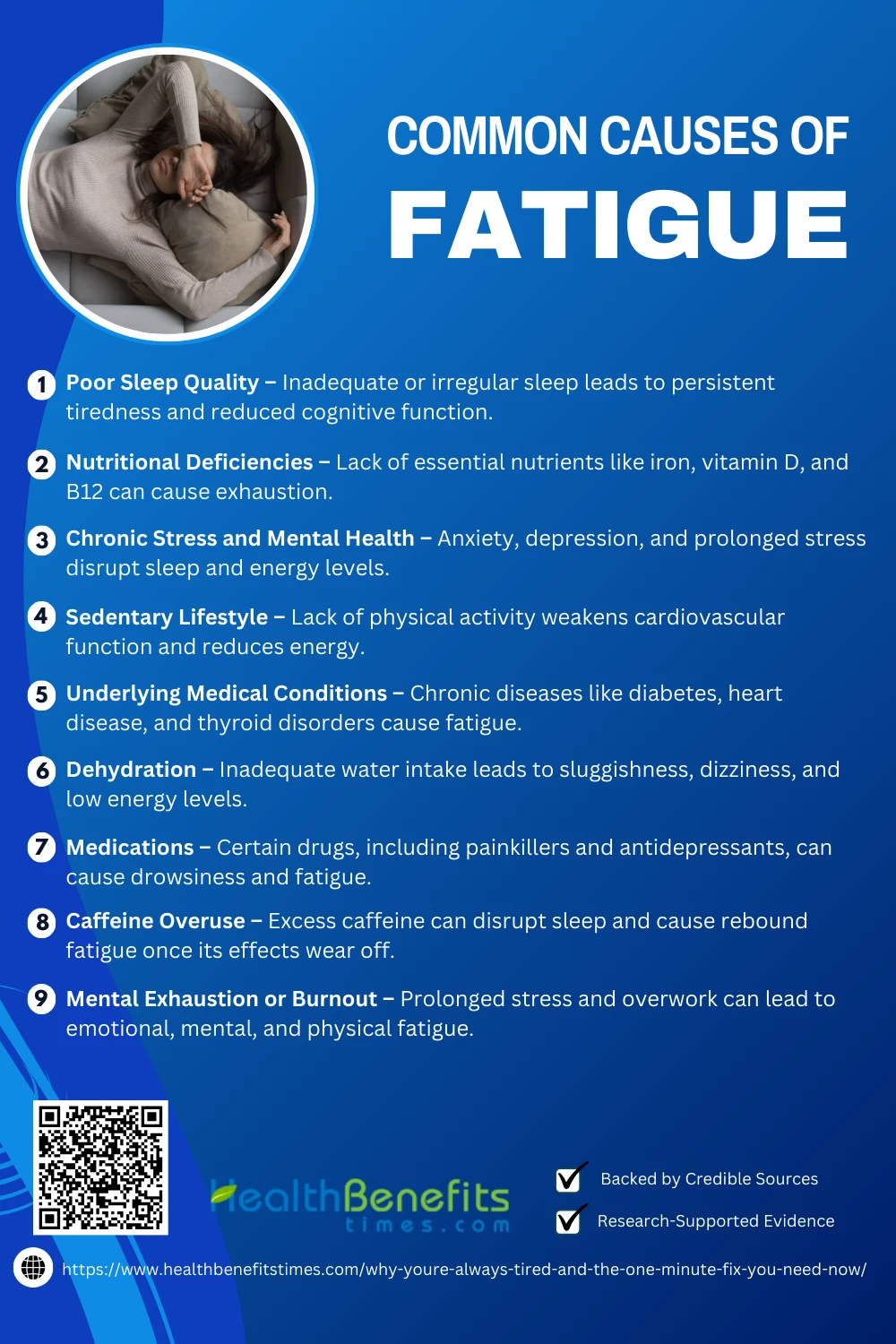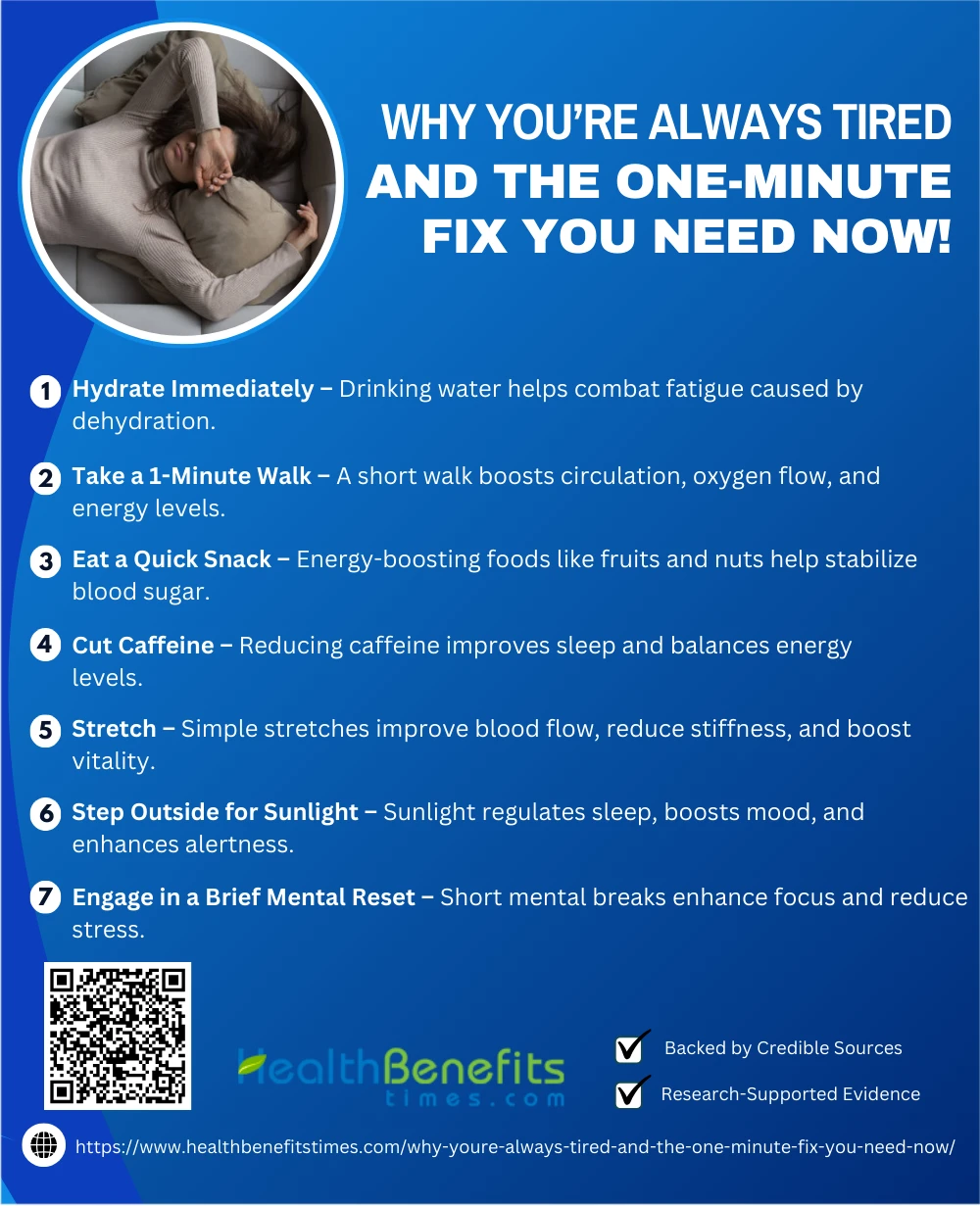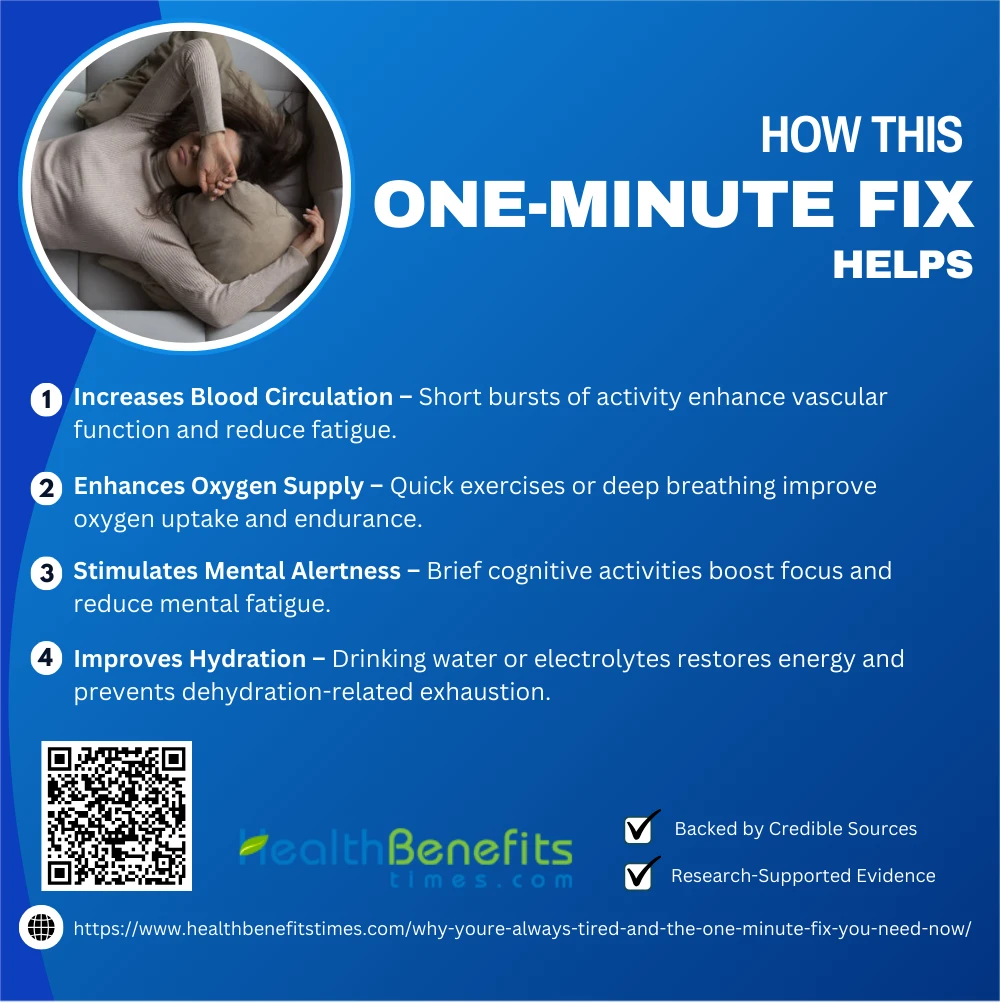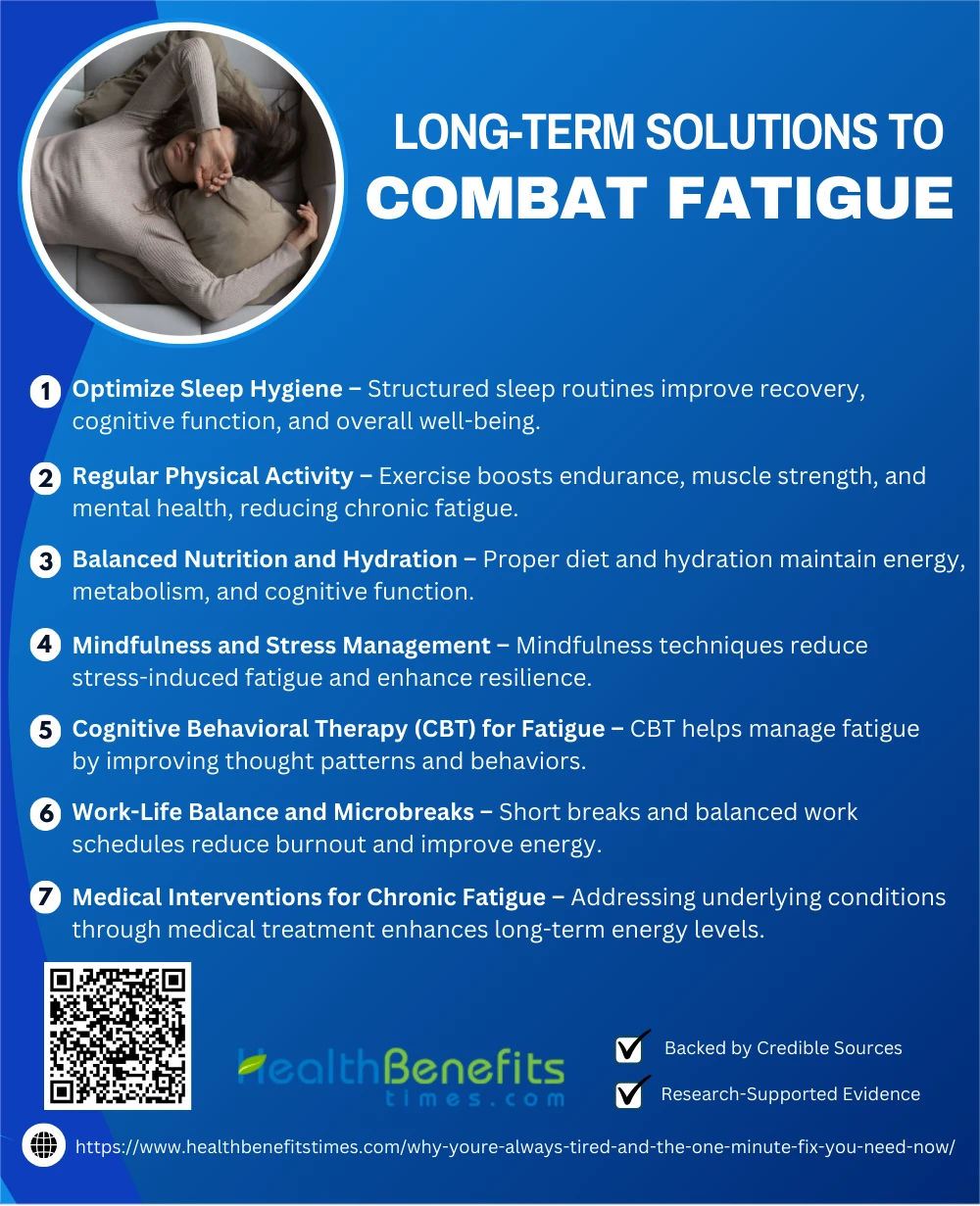- Fatigue is a persistent feeling of tiredness or lack of energy that affects daily activities and overall well-being.
- Poor sleep, stress, dehydration, and nutrient deficiencies are major culprits behind constant exhaustion.
- A quick and simple technique can instantly boost energy, helping you feel more alert and refreshed in just 60 seconds.
 Fatigue is a state of extreme tiredness or lack of energy that can affect both physical and mental functioning, often arising from various lifestyle factors or health conditions.
Fatigue is a state of extreme tiredness or lack of energy that can affect both physical and mental functioning, often arising from various lifestyle factors or health conditions.
Why Are You Always Tired?
If you’ve ever wondered why you’re constantly feeling drained, you’re not alone. Chronic tiredness can result from a variety of factors, including poor sleep hygiene, stress, inadequate nutrition, and even an underlying medical condition. Often, people blame their busy lives, but many fail to address the root causes such as sleep disorders, nutritional deficiencies, or psychological factors like stress or depression. Interestingly, something as simple as poor hydration can also lead to persistent fatigue. Addressing this issue is more than just getting more sleep—it involves tackling the underlying causes. For instance, adjusting your diet to include more energy-boosting foods or implementing short periods of mindfulness exercises could bring significant relief.
The One-Minute Fix You Need Now
While fatigue can often seem like a chronic issue, a simple fix may lie in integrating short, mindful breaks into your routine. Even taking just a minute to practice deep breathing or stretching can reduce the impact of stress on your body and mind. The idea of a “one-minute fix” is rooted in research showing how quick mental resets can alleviate tension and boost energy levels. Simple practices such as these can help reset your body’s rhythms and combat fatigue, allowing you to function more effectively throughout the day.
Common Causes of Fatigue
Chronic fatigue can stem from various sources, affecting both physical and mental well-being. Understanding common causes—such as poor sleep, diet, stress, and inactivity—can help pinpoint solutions to boost energy levels.
Poor sleep quality is a well-documented cause of fatigue, often exacerbating other health conditions. Disruptions in sleep patterns can impair cognitive function and physical performance, leading to persistent tiredness. Research has shown that inadequate or irregular sleep can significantly affect mood and productivity. (1) Chronic sleep deprivation is linked to increased fatigue levels and a reduced ability to cope with stress. (2) Furthermore, sleep disorders like insomnia are prevalent causes of persistent fatigue. (3) Individuals with poor sleep quality experience reduced energy levels, affecting overall well-being and performance. (4)
2. Nutritional Deficiencies
Nutritional deficiencies are a common cause of fatigue, with inadequate intake of essential nutrients leading to low energy levels. Deficiencies in iron, vitamin D, and vitamin B12 are frequently associated with feelings of exhaustion. (5) Iron deficiency, for instance, can lead to anemia, which is a major contributor to fatigue. (6) Additionally, insufficient intake of folic acid can cause tiredness and weakness, particularly in pregnant women. (7) Vitamin D deficiency is also known to affect muscle function and increase tiredness, particularly in older adults. (8)
3. Chronic Stress and Mental Health
Chronic stress and mental health issues like anxiety and depression are common causes of fatigue. Prolonged stress disrupts sleep patterns and affects cognitive function, leading to exhaustion. Research has shown that work-related stress is significantly associated with fatigue. (9) Similarly, individuals with mental health conditions like depression experience persistent fatigue due to imbalances in the brain’s chemicals. (10) Mental exhaustion not only impacts physical well-being but also reduces motivation and productivity. (11)
4. Sedentary Lifestyle
A sedentary lifestyle is another common cause of fatigue, as it negatively impacts the cardiovascular system. With a lack of physical activity, the heart and lungs become less efficient at delivering oxygen to the muscles and tissues, making even low-level activities exhausting. (12) Lack of exercise is also linked to poorer circulation, weak bones, and a slower metabolism, contributing to tiredness and low energy levels. (13) Furthermore, a sedentary routine increases the risk of chronic conditions such as diabetes, which can lead to persistent fatigue. (14)
5. Underlying Medical Conditions
Fatigue can often be a symptom of underlying medical conditions, including chronic diseases like diabetes, heart disease, and thyroid disorders. These conditions interfere with normal bodily functions, leading to persistent tiredness. For example, chronic infections or conditions like chronic fatigue syndrome (9) and thyroid disorders (13) can significantly impact energy levels. Additionally, kidney disease and COPD are linked to extreme fatigue due to reduced organ function and compromised oxygen levels. (13)
6. Dehydration
Dehydration is another common cause of fatigue. When the body is not properly hydrated, it struggles to carry out its normal functions, leading to tiredness and sluggishness. Even mild dehydration can result in symptoms like fatigue, dizziness, and headaches. Drinking adequate water is vital to maintaining energy levels and preventing fatigue. Cleveland Clinic emphasizes that feeling thirsty is already a sign of mild dehydration. (15) Furthermore, dehydration has been linked to chronic fatigue syndrome, affecting overall well-being. (16)
7. Medications
Certain medications are known to cause fatigue as a side effect, especially when they interfere with the central nervous system or disrupt sleep patterns. Common medications that may lead to tiredness include painkillers, antidepressants, and antihistamines (WebMD). These drugs can either cause drowsiness or interfere with the body’s natural rhythms, leading to fatigue. Other examples include chemotherapy drugs and blood pressure medications. (13) People on multiple medications may experience compounded tiredness due to drug interactions. (17)
8. Caffeine Overuse
While caffeine is commonly used to boost energy, overuse can lead to fatigue. Excessive caffeine consumption can disrupt sleep patterns and cause a “rebound fatigue” once its stimulating effects wear off. This can lead to a vicious cycle of tiredness, especially if caffeine is consumed late in the day. (18) Long-term overuse may also cause other symptoms like anxiety and insomnia, further contributing to fatigue. (19) The impact of caffeine on energy levels can be more pronounced in sensitive individuals or those with certain health conditions. (20)
9. Mental Exhaustion or Burnout
Mental exhaustion or burnout can severely contribute to fatigue, especially when individuals experience prolonged periods of stress and overwork. This condition can leave people feeling mentally drained, unmotivated, and emotionally empty. Burnout often involves symptoms like irritability, lack of focus, and physical tiredness. (9) Mental fatigue from trauma or chronic stress can lead to both psychological and physical exhaustion, requiring proper care. (21) In cases of burnout, people may feel as if they have nothing left to give. (22)
The One-Minute Fix: What You Can Do Right Now?
Feeling tired? A simple one-minute fix can help recharge your energy instantly. This quick, effective breathing exercise can provide a much-needed boost, helping you feel refreshed and focused in just 60 seconds.
1. Hydrate Immediately
One of the quickest ways to alleviate fatigue is to hydrate immediately. Dehydration often leads to tiredness, as the body requires water for cellular processes. Even mild dehydration can cause sluggishness, so drinking water can provide an instant energy boost. (23)
2. Take a 1-Minute Walk
Taking a brief 1-minute walk can instantly boost energy and alleviate fatigue. Short bursts of movement increase blood circulation, enhance oxygen flow to tissues, and reset your body’s energy levels. This quick activity has been proven to reduce tiredness and improve focus. (24) (25)
3. Eat a Quick Snack
Snacking on energy-boosting foods like fruits, nuts, or yogurt can provide an immediate boost in energy levels. These foods, rich in complex carbohydrates, fiber, and protein, support sustained energy. (26) Quick snacks can help stabilize blood sugar, preventing energy dips. (27) Foods like whole grains and beans also contribute to longer-lasting vitality. (28)
4. Cut Caffeine
Cutting down on caffeine can improve sleep quality and reduce feelings of anxiety, both of which are essential for combating fatigue. Gradually reducing caffeine intake and replacing it with hydration or healthy snacks can be effective Medical News Today. (29) Additionally, staying hydrated throughout the day and practicing deep breathing can ease symptoms of caffeine withdrawal Cleveland Clinic. (30) Research shows that avoiding caffeine at the wrong times improves overall energy balance. (31)
5. Engage in a Brief Mental Reset
Taking brief mental breaks can help restore mental clarity and reduce fatigue. Research shows that regular breaks during work improve cognitive function and reduce stress. (32) Even short walks or light stretching can significantly enhance mental energy. (26) Engaging in relaxing activities, like yoga, also helps counter mental fatigue. (33)
6. Stretch
Stretching can effectively combat fatigue by increasing blood flow and oxygen levels in the body. Simple stretches, such as neck or shoulder rolls, can help reduce stiffness and enhance energy levels Focus Physical Therapy. This can boost both physical and mental vitality, especially during mid-day slumps. (27) Additionally, stretching supports better posture, preventing the physical strain that contributes to tiredness. (34)
7. Step Outside for Sunlight
Exposure to natural sunlight helps regulate circadian rhythms and boost energy by reducing melatonin levels in the body. Getting outside in the morning helps you feel more awake and alert throughout the day. (35) Sunlight exposure is also vital for vitamin D production, which can further alleviate fatigue. (36) Additionally, spending time outside can improve mood and reduce stress, factors that contribute to fatigue. (37)
How This One-Minute Fix Helps
Feeling constantly fatigued? This simple, one-minute fix can boost your energy and refresh your mind, providing immediate relief from tiredness and helping you tackle the day with renewed vigor and focus.
1. Increases Blood Circulation
A simple one-minute fix can significantly boost blood circulation and alleviate fatigue, according to recent studies. Research suggests that high-intensity interval training, even for as little as one minute, can enhance vascular function and oxygen delivery, improving overall endurance and reducing fatigue. Additionally, short bursts of cognitive activities during breaks can help accelerate recovery from fatigue, as found in workplace studies. (38) Moreover, vibratory massage techniques have been shown to increase blood flow and support faster muscle recovery. (39)
2. Enhances Oxygen Supply
A quick one-minute breathing exercise or physical movement can significantly boost oxygen supply and reduce fatigue. Research suggests that short bursts of high-intensity activity improve oxygen uptake efficiency, supporting muscle function and endurance. Additionally, deep breathing exercises can increase oxygenation, enhance cognitive function, and alleviate stress-related fatigue. (40) Furthermore, studies indicate that consuming hydrogen-rich water after brief physical exertion can improve oxygen delivery to muscles and reduce post-exercise fatigue. (41)
3. Stimulates Mental Alertness
A simple one-minute cognitive exercise can significantly boost mental alertness and reduce fatigue. Studies show that short mental breaks, such as quick problem-solving or mindfulness, can enhance cognitive function and restore focus. (38) Additionally, brain stimulation techniques, including deep breathing, have been shown to improve concentration and energy levels (Dow, 2015). Furthermore, stress-reducing strategies like Heart Focus meditation for one minute a day can improve brain function and mitigate mental fatigue.
4. Improves Hydration
Rehydrating for just one minute with water or electrolyte solutions can significantly reduce fatigue and enhance overall energy levels. Research highlights that short hydration breaks help prevent dehydration-related exhaustion and improve exercise endurance. Additionally, proper hydration strategies using optimal water intake methods have been linked to improved cellular function and metabolic efficiency. Moreover, drinking hydrogen-rich water for one minute post-exercise has been shown to reduce muscle fatigue and enhance recovery. (41)
Long-Term Solutions to Combat Fatigue
Fatigue can be a persistent issue affecting physical and mental well-being. Long-term strategies focus on lifestyle, medical interventions, and environmental factors to ensure sustained energy and health. Below are evidence-based solutions:
Optimizing sleep hygiene is a crucial long-term strategy to combat fatigue and enhance overall well-being. Research indicates that structured sleep programs significantly improve recovery and reduce workplace fatigue. (42) Additionally, sleep interventions tailored for athletes demonstrate enhanced cognitive and physical performance, reinforcing the importance of maintaining consistent sleep patterns. (43) Furthermore, workplace studies highlight the role of sleep hygiene education in reducing chronic fatigue and optimizing alertness during demanding tasks. (44)
2. Regular Physical Activity
Engaging in regular physical activity is an effective long-term strategy to combat fatigue by enhancing cardiovascular endurance, muscle strength, and mental well-being. Research has shown that structured exercise routines can significantly reduce chronic fatigue symptoms and improve energy levels. (45) Additionally, incorporating targeted physical exercises has been found to help individuals recover from prolonged inactivity and neuromuscular issues, thereby restoring overall vitality. (46) Furthermore, regular exercise contributes to cognitive and mental health improvements, especially in individuals recovering from long-term stress and illness. (47)
3. Balanced Nutrition and Hydration
Maintaining balanced nutrition and proper hydration is a key long-term strategy to fight fatigue by ensuring sustained energy levels and metabolic efficiency. Studies highlight that a diet rich in essential macronutrients and hydration supports optimal muscle function and reduces exercise-induced exhaustion. (48) Moreover, proper hydration has been linked to improved cognitive function and focus, particularly in physically active individuals. (48) Additionally, electrolyte balance plays a crucial role in preventing fatigue-related symptoms by optimizing nerve signaling and muscle contractions, reinforcing the need for adequate hydration strategies. (48)
4. Mindfulness and Stress Management
Incorporating mindfulness and stress management techniques is a proven long-term strategy to alleviate fatigue and improve mental clarity. Research shows that mindfulness programs significantly reduce stress-induced fatigue and enhance cognitive resilience. (47) Additionally, structured mindfulness-based interventions help regulate emotions and mitigate exhaustion caused by perfectionism and overworking. Furthermore, stress management strategies, including digital detox and relaxation techniques, play a crucial role in improving long-term well-being and reducing chronic fatigue. (49)
5. Cognitive Behavioral Therapy (CBT) for Fatigue
Cognitive Behavioral Therapy (CBT) is a highly effective long-term solution for managing fatigue by addressing negative thought patterns and promoting behavioral change. Studies indicate that CBT interventions significantly reduce fatigue severity and improve psychological resilience. Additionally, CBT has been successfully implemented in fatigue management programs for individuals experiencing chronic stress and sleep disorders, leading to sustained energy improvements. (47)
6. Work-Life Balance and Microbreaks
Maintaining work-life balance and incorporating microbreaks into daily routines is a powerful strategy to prevent long-term fatigue and burnout. Research indicates that short, frequent breaks throughout the workday significantly enhance energy levels and productivity. Additionally, studies on remote workers show that structured microbreaks improve cognitive function and reduce mental exhaustion. (50) Furthermore, systematic reviews highlight that scheduled work pauses improve overall well-being and reduce fatigue-related impairments in performance. (51)
7. Medical Interventions for Chronic Fatigue
Medical interventions play a crucial role in managing chronic fatigue by addressing underlying health conditions and optimizing treatment strategies. Research highlights that thyroid hormone therapy effectively reduces fatigue in patients with hypothyroidism, improving long-term energy levels. (52) Additionally, sustainable integrative medicine approaches, including dietary and lifestyle modifications, have been shown to enhance resilience against fatigue-related disorders. (53) Furthermore, recent studies suggest that improving sleep quality through targeted interventions can mitigate chronic fatigue symptoms and enhance cognitive function. (54)
Conclusion
If you’re always feeling drained, it’s time to take action. This one-minute fix is a quick, effective way to recharge your energy and break free from constant fatigue. Small changes can make a big difference, and by incorporating this simple solution into your routine, you’ll feel more refreshed, focused, and ready to take on your day. Don’t let exhaustion control your life—try this easy fix now and experience the boost you need!






